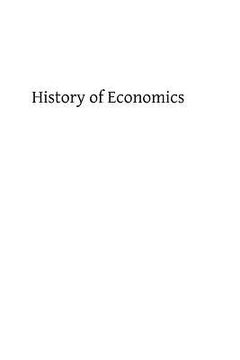History of Economics: or Economics as a Factor in the Making of History (en Inglés)
Reseña del libro "History of Economics: or Economics as a Factor in the Making of History (en Inglés)"
In this time of economic upheaval and insurmountable debt, it is easy yo see the economics will shape the near future. How has it shaped the past? What can we learn from the past? The influences or laws that shape the events of history are many and various. They may, however, all be summed up under three great categories, namely: Physical Surroundings, Religion, and Economics. From time immemorial, the physical surroundings of a nation have vitally determined its history. Climate, whether hot or cold, the configuration of the country, whether it be an island or a part of a continent, the resources of the soil, whether agricultural or mineral, have their share in determining the political place and habitual occupations of a nation. Athens, Carthage, Venice, England, all became great maritime and commercial powers on account of their proximity to the sea. Small frontier nations, on the other hand, like Phenicia and Prussia, have been forced into a condition of hot-bed artificial strength, owing to the necessity of constantly providing against danger from their more powerful neighbors. To an almost equal extent have the productions of the soil been instrumental in determining the whole character and history of a nation. The abundance of precious metals, the bountiful supply of iron, or the exuberant fertility of the soil, all determine the aver- age occupation of the citizen and the wealth of the nation and the power of the State. Religion is another very important influence in the shaping of history. Man's conduct is swayed, to a great extent, by his religious belief. If we leave aside the influence of religion, the history of the Eastern peoples is an insoluble enigma. If, in Greek history, we leave religion out of account, the old Greek oracles with their inspiring utterances, obeyed alike by all classes of society, would no longer appear on the pages of history, and the Greek religious assemblies, such as those of the Amphictyonic Councils, which at one time seemed likely to bring about the unity of Greece, would likewise vanish. Indeed, Greek history, without the religious element, would be cut down by at least one half, and even the remaining half would be void of meaning. Finally, we come to the third category of formative causes, namely, economics. This element, as we shall see, is also of the greatest importance, and this not only on account of its own intrinsic activity, but because it is so intimately bound up with the other two important formative influences in history, namely, physical surroundings and religion. By economics is meant the science of wealth, and this, again, means the knowledge of the laws that govern the production of wealth, and its distribution. We might, perhaps, express this definition in simpler terms by saying that economics is the science of how a man makes his wealth, and how he gets it. It is evident, then, that economics must have an almost unbounded influence on human conduct, both public and private. For the great majority spend the greater part of their time either in producing or distributing wealth, and, from the point of view of extension, the time that an ordinary man has to employ in earning his daily bread is greater than that which he can possibly expend in explicit acts of religion. This all-pervading activity of economics is still more apparent in the State or commonwealth. In the whole course of ancient and modern history, there is scarcely any single important political event that has not been caused, either directly or indirectly, by some economic influence. Religion and physical causes may also have been present, but the economic factor seems to have been the most constant and the most pervasive. Although we shall be anticipating what will come afterwards, a few examples taken from typical nations will serve to illustrate this statement.

